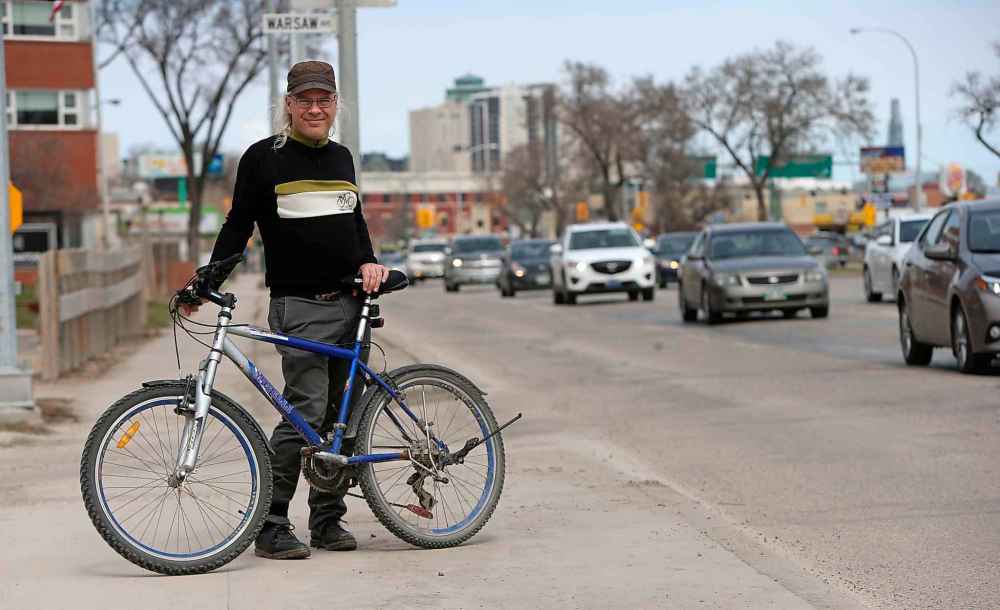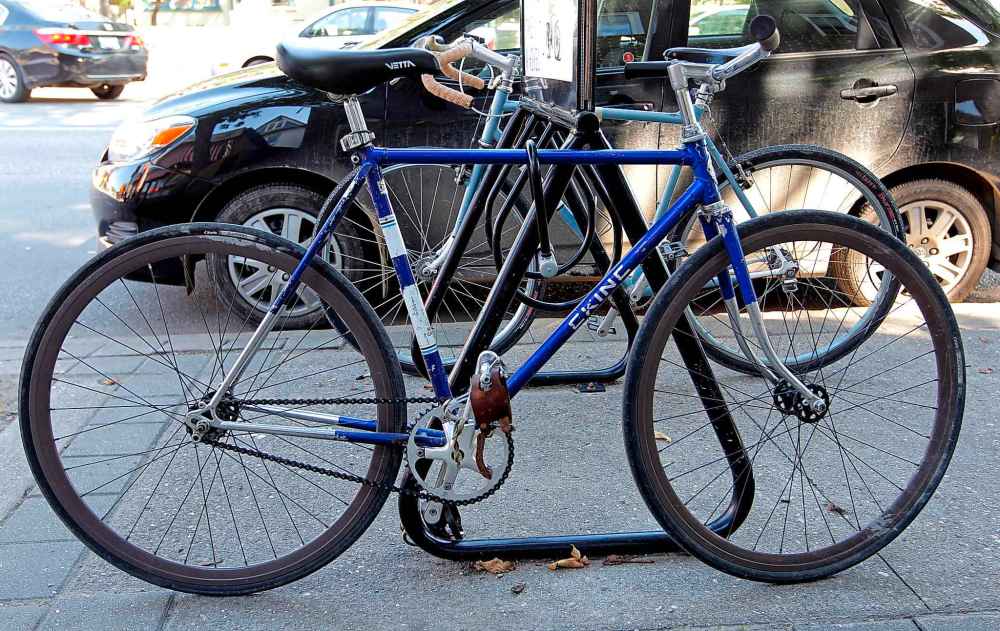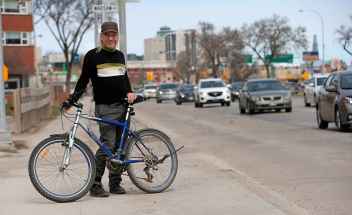While bike thefts soar, city spins its wheels over possible solutions
Read this article for free:
or
Already have an account? Log in here »
To continue reading, please subscribe:
Monthly Digital Subscription
$0 for the first 4 weeks*
- Enjoy unlimited reading on winnipegfreepress.com
- Read the E-Edition, our digital replica newspaper
- Access News Break, our award-winning app
- Play interactive puzzles
*No charge for 4 weeks then price increases to the regular rate of $19.95 plus GST every four weeks. Offer available to new and qualified returning subscribers only. Cancel any time.
Monthly Digital Subscription
$4.99/week*
- Enjoy unlimited reading on winnipegfreepress.com
- Read the E-Edition, our digital replica newspaper
- Access News Break, our award-winning app
- Play interactive puzzles
*Billed as $19.95 plus GST every four weeks. Cancel any time.
To continue reading, please subscribe:
Add Free Press access to your Brandon Sun subscription for only an additional
$1 for the first 4 weeks*
*Your next subscription payment will increase by $1.00 and you will be charged $16.99 plus GST for four weeks. After four weeks, your payment will increase to $23.99 plus GST every four weeks.
Read unlimited articles for free today:
or
Already have an account? Log in here »
Hey there, time traveller!
This article was published 22/05/2019 (2418 days ago), so information in it may no longer be current.
What, you may ask, is the City of Winnipeg doing to combat bike theft?
Interesting question. Unfortunately, to date we mostly know what the city is not doing.
Last week, city administrators recommended against a mandatory bike registration program at the point of sale. The city already has an online bike registry, but it is optional. A city committee will still consider making it mandatory, but the thumbs down from administrators does not bode well for this idea.

Of greater concern is the fact the six-page report tabled last week contains virtually no other ideas for combating bike theft other than “improving public education.” Given the size and nature of the problem, that is a weak response.
Bikes are easy to steal, even easier now that cordless grinders and saws have given thieves the ability to carve through almost any lock, chain or fixture being used to secure a bike. More than 3,000 bikes are reported stolen every year; about 1,000 are recovered but less than 10 per cent of them find their way back to rightful owners.
The broader concern is bicycle theft is directly connected to the meth crisis. Addicts looking for cash steal and sell bikes because they are relatively easy to grab and unload. Some end up in scrap metal yards, while others are sold in face-to-face transactions, or through online classified sites.
Faced with these conditions, it’s no wonder hardcore cyclists are frustrated. “It’s a very tough issue to deal with,” said Mark Cohoe, executive director of Bike Winnipeg. “There’s a convergence of things that have made it easier to steal and sell stolen bikes. We really need to do a bit more to deal with this problem, because it will create other problems down the road.”
One of the most frequent concerns expressed by cyclists is the apparent indifference of the Winnipeg Police Service. Even when a bike has been registered, and when there is clear evidence suggesting it has been put up for sale in an online classified ad, police lack the resources to pursue the theft.
A friend experienced this two years ago after his 18-year-old son’s $400-bicycle was stolen. The day after the bike went missing, my friend and his son found it for sale on Kijiji. It seemed like a slam-dunk opportunity to bust some crime.
But after visiting the local community police office, my friend found out that in most instances, there are no resources to track down individual stolen bikes. In my friend’s case, it meant police declined his request to confront the person who had posted the stolen bike online.
It should be noted the WPS does undertake a number of measures to combat bike theft. It runs a sting program where bikes equipped with GPS trackers are left in high-risk areas. Once stolen, police track its location and make an arrest, which has happened several times. The WPS is also heavily involved in public education, encouraging cyclists to register and lock their bikes and report thefts.
However, when it comes to investigating an individual theft, resources run thin.
A WPS spokesman noted that with dramatically increasing calls volumes, many of them involving elevated risk to someone’s well-being or life, crimes like this are constantly pushed down the list of policing priorities. “We can only help when resources allow for it,” the spokesman said.
That is not a cop-out, if you’ll pardon the pun. In fact, when you look at all of the things the police are asked to do, it’s easy to see how bike theft is given a lower priority.
That does not mean there are no solutions.

For example, currently most online classified sites do not require anyone selling a bike to post a registration number with the advertisement. (All bikes have a unique, engraved number somewhere on their frames.) Being required to include a registration number, or rejecting ads that do not have them, could make it harder to fence a stolen bike.
And rather than create its own online registry, Winnipeg could follow the example of other cities that employ free, third-party apps to create a community watch system for bicycles.
Vancouver relies heavily on Garage 529, a free app developed by a private company in the U.S. that allows cyclists to register their bikes on a continent-wide data base. For $13, the app sells you a “shield,” a decal that tells would-be thieves that your bike is registered. If your bike is taken, you can notify the entire app community, and people can help provide information to aid in its recovery.
Proponents believe the app not only allows more stolen bikes to be returned to their owners, but also acts as a deterrent to thieves. Law enforcement and other interested parties agree; hundreds of police services, schools and pro-bike groups across North America support Garage 529 by publicizing it and selling shields. The Brandon Police Service is the only participating agency in Manitoba.
It appears to be working. In Vancouver, public education by police and Garage 529 have been credited with a 30-per-cent drop in bike thefts.
Another possible solution would be for the WPS to occasionally track down and punish people selling stolen bikes online. As is the case with the bike-bait program, a single, well-publicized arrest of an online fence would make for a powerful deterrent.
Which brings us back to a single administration report produced for a single civic committee. The city cannot rely solely on the WPS, and needs to go beyond “public education” to address this problem.
Fortunately, there are good ideas out there just waiting to be found.
dan.lett@freepress.mb.ca

Dan Lett is a columnist for the Free Press, providing opinion and commentary on politics in Winnipeg and beyond. Born and raised in Toronto, Dan joined the Free Press in 1986. Read more about Dan.
Dan’s columns are built on facts and reactions, but offer his personal views through arguments and analysis. The Free Press’ editing team reviews Dan’s columns before they are posted online or published in print — part of the our tradition, since 1872, of producing reliable independent journalism. Read more about Free Press’s history and mandate, and learn how our newsroom operates.
Our newsroom depends on a growing audience of readers to power our journalism. If you are not a paid reader, please consider becoming a subscriber.
Our newsroom depends on its audience of readers to power our journalism. Thank you for your support.











